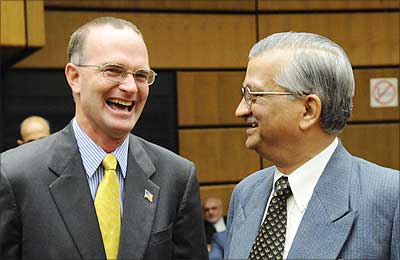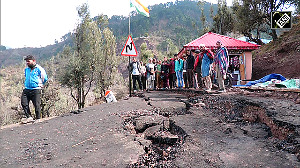 The India-specific safeguards agreement was on Friday approved by the Board of Governors of the International Atomic Energy Agency by consensus in a key step to implement the Indo-US nuclear deal.
The India-specific safeguards agreement was on Friday approved by the Board of Governors of the International Atomic Energy Agency by consensus in a key step to implement the Indo-US nuclear deal.
The agreement that will open India's 14 of the 22 existing and future nuclear reactors for inspections by the UN nuclear watchdog got the green signal from the 35-member Board of Governors of the IAEA after a three-hour meeting.
Explained: IAEA safeguards agreement
With the landmark nuclear deal having passing the first international test, India still needs a waiver from the 45-member Nuclear Suppliers Group for resumption of nuclear trade and approval by the US Congress before the deal can come into force.
Text of India's draft IAEA safeguards agreement
In the first reaction from the Indian government, Science and Technology minister Kapil Sibal voiced optimism that New Delhi will get a 'clean and unconditional' exemption at the NSG, which is likely to meet around August 21 in Vienna.
With India and the US on an overdrive to fast track the deal, the nuke accord may come before the US Congress for ratification sometime next month once the NSG clearance is obtained.
What the IAEA agreement gives India
After its meeting, the Board of governors authorised IAEA Director General Muhammed ElBaradei to conclude with the Indian government and subsequently implement the India-specific safeguards pact.
Sources said it was a smooth passage for the safeguards pact at the Board meeting after ElBaradei gave enough indications that the pact will sail through when he said the accord conformed to 'all the legal requirements' of his agency and that talks had begun on a system of extended inspections.
India's journey to the IAEA to get the approval of the safeguards pact was marked by a lot of bad blood between the UPA government and its outside supporters Left which ultimately led the communist parties to withdraw support over the nuke deal last month.
The government, which staked its survival over the nuke deal, moved full throttle in approaching the IAEA on July nine to push the stalled deal forward, a day after the Left withdrew support to the Manmohan Singh government.
India's N-programme: The perils ahead
Tabling the safeguards text at the start of the meeting, ElBaradei said: "These are not comprehensive or full-scope safeguards (unlike with NPT member states). But it (agreement) satisfies India's needs while maintaining all the Agency's legal requirements."
ElBaradei's remarks gave a boost to the prospects for the Indo-US nuclear deal and the 27-member European Union too threw its weight behind the safeguards pact that set the stage for its approval.
That Obscure Object of Desire: Nuclear energy
The US described the approval of India-specific safeguards agreement as a key step in the implementation of the Indo-US nuclear deal and vowed to 'vigorously' obtain an India-specific exception in the NSG and clearance from the US Congress.
"Friday's approval of India-specific safeguards agreement by the International Atomic Energy Agency Board of Governors is a key step towards implementation of the US-India Civil Nuclear Cooperation initiative.
Do we really need the nuclear deal with the US?
"We will work vigorously with India to obtain an India-specific exception in the Nuclear Suppliers Group and the final US Congressional approval," US Ambassador to India David C Mulford said in a statement in New Delhi.
Mulford gave his reaction from the US, where he has gone on a short break.
In a strong backing for the safeguards pact, ElBaradei said the agreement's 'umbrella' nature provides a more efficient mechanism for ensuring that safeguards requirements can be met.
Is the nuclear deal about big business?
"It is an 'umbrella agreement', which provides for any facility notified by India to the agency in the future to become subject to safeguards," he said.
Touching upon an area of concern, he said India and the IAEA have already begun discussions on an Additional Protocol, which will be specific to the country -- a system of short notice, wider-ranging inspections.
In a debate preceding the decision to approve the safeguards text, several countries, including Brazil, Iran, Japan, Ireland, Austria and Switzerland voiced reservations about the agreement, diplomats said.
'Not enough time to pass N-deal in US '
Iran, which the West has accused of seeking atomic weapons under the cover of a civilian nuclear progamme, accused the US of double standards in its dealings with nuclear powers.
"Iran expresses its serious concern about the double standard policy of the United States which has and shall undermine the credibility, integrity and universality of the NPT," Iranian ambassador to the IAEA, Ali Aghar Soltnieh, told the board of governors.
'An open debate won't hurt India'
"There is a serious concern that the United States has taken this step with the intention to create precedence and pave the way for Israel to continue its clandestine weapon activities," he added.
US ambassador to the IAEA Gregory Schulte urged the board to approve the agreement, saying it was 'little different' from those between the IAEA and other countries 'which have invariably been adopted by this body swiftly, and by consensus'.
'US wants to cap our nuclear programme'
France, which holds the rotating EU presidency, said the agreement would help 'strengthen' the international non-proliferation regime.
"The deal will allow new facilities to be placed under supervision. The agency will thus be able to give assurances about the peaceful use of a greater number of facilities," France said in a statement.
Image: US ambassador to IAEA Gregory Schulte with Atomic Energy Commission Chairman Anil Kakodkar during the opening of the Board of Governors meeting at the IAEA's headquarter in Vienna on Friday.
Photograph: Samuel Kubani/AFP/Getty Images






 © 2025
© 2025